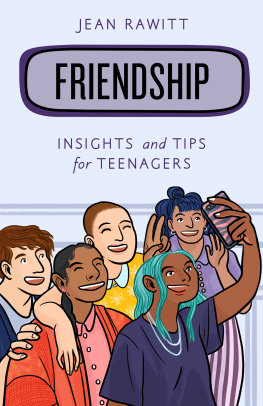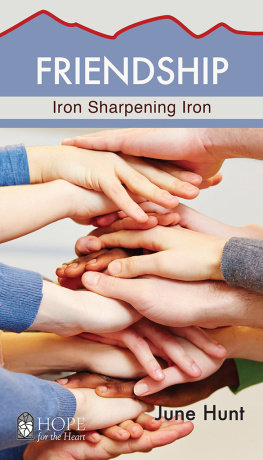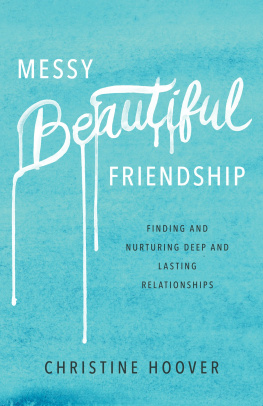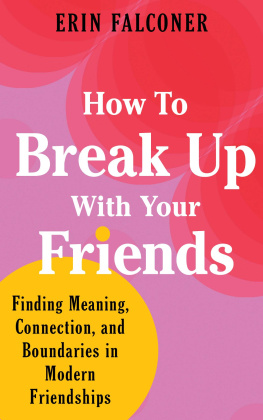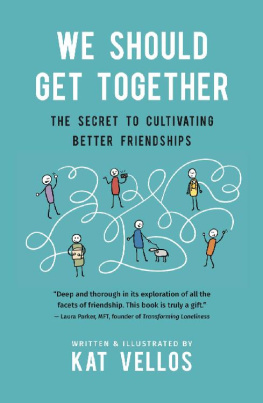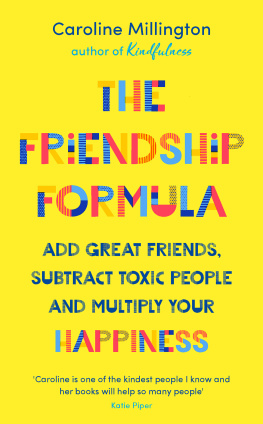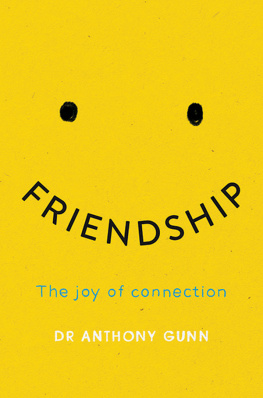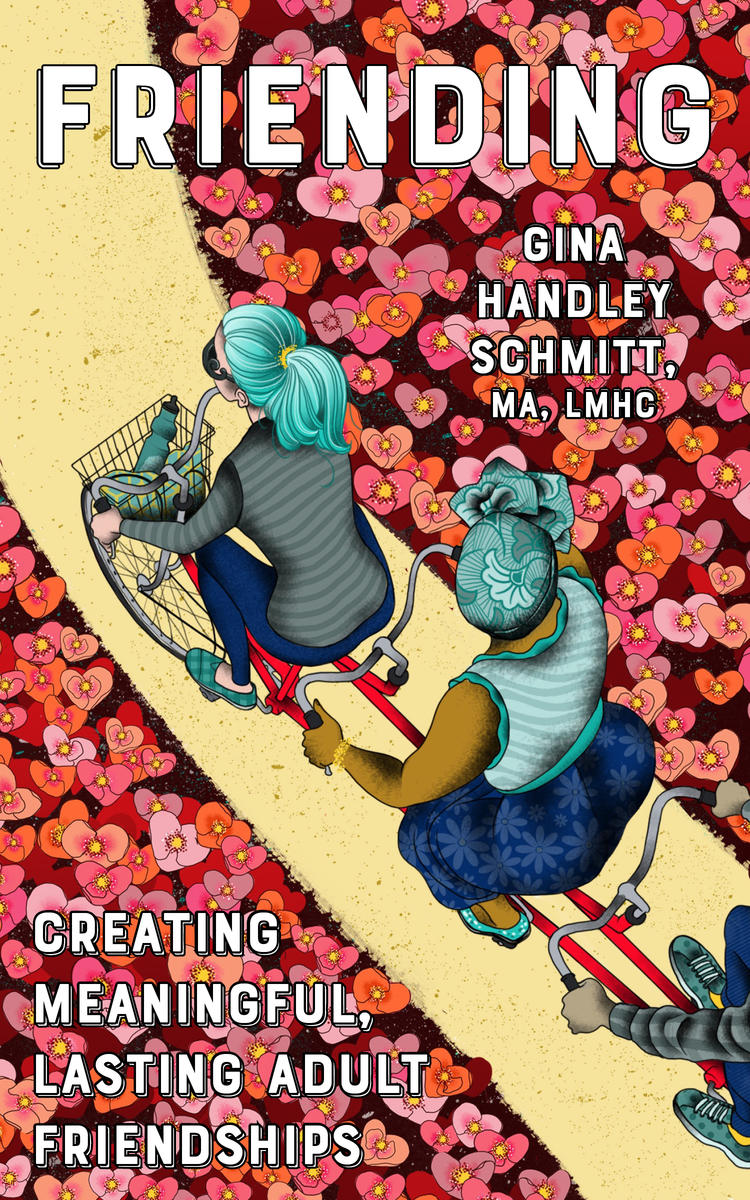FRIENDING
Creating Meaningful, Lasting Adult Friendships
Gina Handley Schmitt, MA, LMHC , 2019
This Edition Microcosm Publishing 2019
First published November 12, 2019
ISBN 978-1-62106-255-4
This is Microcosm #309
Edited by Elly Blue
Cover by Cecilia Granata
Book design by Joe Biel
For a catalog, write or visit:
Microcosm Publishing
2752 N Williams Ave.
Portland, OR 97227
www.microcosmpublishing.com
Names, identifying information, and circumstances have been changed in the interest of privacy.
If you bought this on Amazon, Im so sorry because you could have gotten it cheaper and supported a small, independent publisher at www.Microcosm.Pub
To join the ranks of high-class stores that feature Microcosm titles, talk to your rep: In the U.S. Como (Atlantic), Fujii (Midwest), Book Travelers West (Pacific), Turnaround in Europe, Manda/UTP in Canada, New South in Australia, and GPS in Asia, India, Africa, and South America.
Global labor conditions are bad, and our roots in industrial Cleveland in the 70s and 80s made us appreciate the need to treat workers right. Therefore, our books are MADE IN THE USA and printed on post-consumer paper.

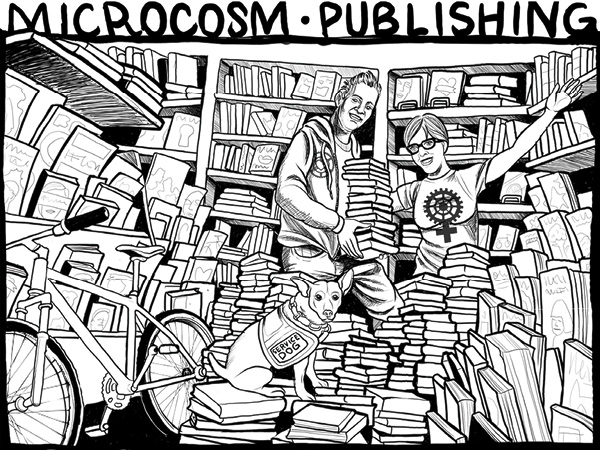
Microcosm Publishing is Portlands most diversified publishing house and distributor with a focus on the colorful, authentic, and empowering. Our books and zines have put your power in your hands since 1996, equipping readers to make positive changes in their lives and in the world around them. Microcosm emphasizes skill-building, showing hidden histories, and fostering creativity through challenging conventional publishing wisdom with books and bookettes about DIY skills, food, bicycling, gender, self-care, and social justice. What was once a distro and record label was started by Joe Biel in his bedroom and has become among the oldest independent publishing houses in Portland, OR. We are a politically moderate, centrist publisher in a world that has inched to the right for the past 80 years.
TABLE OF CONTENTS
INTRODUCTION

T en years ago, one of my therapy clients invited me to go to a movie. There was a new film in the theaters that she was convinced we would both enjoy (and I was convinced that she was right), but I had to carefully explain to her that while I was flattered by her invitation, due to our professional relationship, I was not actually ethically permitted to accompany her to a movie, however much we might both have enjoyed the film. She cried.
As we processed the reason for her emotional response, she confided that I was her only friend. She shared that she did not know how to make adult friendships. She also shared that any efforts she had made to connect with other peers in the previous few years had ended in her feeling rejected, leaving her feeling even more alone, and fearing she was destined to be so permanently.
This sweet client was to be the first of many who would sit on my therapy couch and confide in me their struggles to make meaningful, enduring friendship connections. Some of these clients had lost their connections over the years due to their changing life circumstances. Others had never developed these meaningful connections in the first place. But either way, one thing was the same: all of them were desperately wanting healthy, long-term friendsas I have come to believe most of us do.
The more this situation played itself out in my counseling practice, the more I realized that our society was experiencing a crisis of sorts. In fact, my research since then has revealed that 25% of adults report having zero trusted confidants. That is 1 in 4 people without a single person to share the most intimate parts of their lives with. One in four . I realized that this lack of meaningful, enduring friendship connections in our society seemed to be driving more and more people to my therapy couch in an attempt to fill this void. But for those who were lonely but could not afford therapy, I wondered what replacements they had chosen. These hard realities motivated me to think more seriously about how this had happened, what societal factors may have contributed, and what I might know that could help people struggling to make and keep adult friends.
My quest to understand this friendship crisis led me to think more about the relevant shifts in our society over the last few decades, as we have almost completely changed the way we interact with our friends. Only 20 years ago, we didnt have smart phones and lightning fast internet connections. If we wanted to connect, we would have to issue a face-to-face invitation for an in-person hangout. Or, at least, wed have to pick up a landline, dial a telephone number, and have a voice-to-voice conversation. Today, if we want to connect, we can email, text, message on Facebook, tweet, send a Snapchatthe list goes on. We have so many more means for communicating, but many of these means seem more conducive to creating a multitude of shallow connections and few, if any, deep, intimate connections. Social media provides us with the opportunity for quantity but not necessarily quality. We each have hundreds of friends on Facebook, but 42.6 million American adults report suffering chronic loneliness. I dont think the correlation between the rise in technology dependence and the rise in adult loneliness is a mere coincidence.
I use and enjoy many online platforms for connecting with friends, and I wholeheartedly believe that technology can aid in facilitating and enhancing our friendships. Research indicates that the moderate use of technology in our friendships is not intrinsically harmful to the relationships, and that regular reciprocated social media posting can actually yield significant relationship rewards. That said, the research is also clear that technology can be problematic when relied upon as the main sustenance for our friendships. So, the challenge, then, is to ensure that we have balance in our relationships, and that we dont find ourselves with innumerous online friends, while simultaneously being chronically lonely.
My ongoing research on loneliness suggests that it has more far-reaching effects than we may realize. Loneliness can increase a persons risk of early death by more than 26%more than a long-term smoking habit or consistent exposure to air pollution. Alternatively, close friends can decrease our tension, stress, and depression, while increasing our bodies defenses and our overall life satisfaction.
In addition to considering societal shifts over time and accompanying research, I have also spent a significant amount of time reflecting on my own personal friendship-making journey. In addition to being a therapist and relationship expert, I am also a forty-something woman who has herself been lost in the process of creating meaningful, enduring friendships many times. I have moved over a dozen times throughout my life, and, with that, have had to start or restart many friendships over the years. This has been no easy task, and I have experienced the loneliness that often accompanies being the new kid more times than I care to remember. However, these experiences have also offered me the opportunity to practice meeting new people and creating new friendships. Through all of these experiences, I have come to wholeheartedly believe that making and keeping good friends is essential to our universal need for connection and sense of belonging.


